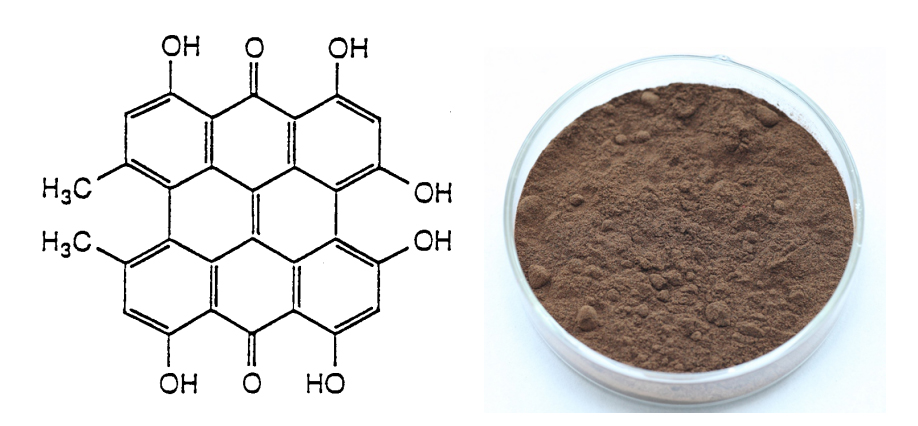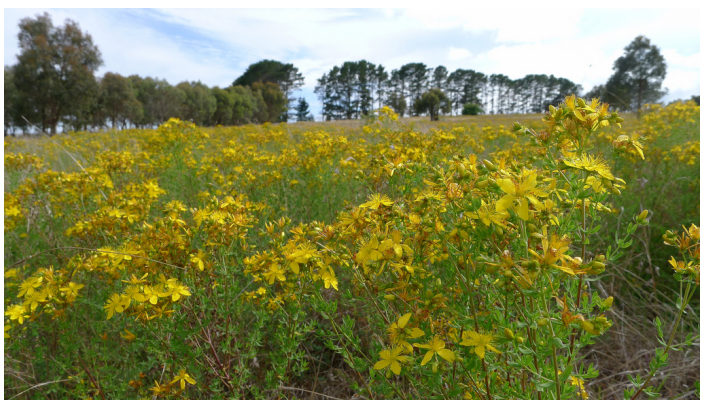Manufacturer of St John’s wort extract Wholesale to Australia
Manufacturer of St John’s wort extract Wholesale to Australia Detail:
[Latin Name] Hypericum perforatum
[Plant Source] From China
[Appearance] Brown fine powder
[Specifications] 0.3% Hypericin
[Particle size] 80 Mesh
[Loss on drying] ≤5.0%
[Heavy Metal] ≤10PPM
[Pesticide residue] EC396-2005, USP 34, EP 8.0, FDA
[Storage] Store in cool & dry area, keep away from the direct light and heat.
[Package] Packed in paper-drums and two plastic-bags inside.
[What is St. John's wort]
St. John’s wort (Hypericum perforatum) has a history of use as a medicine dating back to ancient Greece, where it was used for a range of illnesses, including various nervous disorders. St. John’s wort also has antibacterial, antioxidant, and antiviral properties. Because of its anti-inflammatory properties, it has been applied to the skin to help heal wounds and burns. St. John’s wort is one of the most commonly purchased herbal products in the United States.
In recent years, St. John’s wort has been studied extensively as a treatment for depression. Most studies show that St. John’s wort may help treat mild-to-moderate depression, and has fewer side effects than most other prescription antidepressants.
[Functions]
1. Anti-depressive and sedative properties;
2. Effective remedy for the nervous system, relaxing tension, and anxiety and lifting the spirits;
3. Anti-inflammatory
4. Improve capillary circulation
Product detail pictures:

Related Product Guide:
To fulfill the customers' over-expected fulfillment , we have now our solid staff to deliver our greatest general assistance which includes internet marketing, product sales, creating, manufacturing, excellent controlling, packing, warehousing and logistics for Manufacturer of St John’s wort extract Wholesale to Australia , The product will supply to all over the world, such as: Guatemala, Poland, Philadelphia, Our solutions have national accreditation standards for experienced, premium quality items, affordable value, was welcomed by people around the globe. Our goods will continue to increase in the order and look forward to cooperation with you, Really should any of those products be of interest to you, please letus know. We are going to be pleased to give you a quotation up on receipt of one's detailed specifications.
This is something I never thought I would do, but after finding so much benefit from adding Barley Grass Juice Powder (BGJP) to my raw food lifestyle I am really excited to share this amazing product with you. Convenient, delicious and jam packed with trace minerals often lacking in commercial produce (which I often eat / can only find while traveling) I find BGJP invaluable. After trying out numerous brands over the last 3 years I am really excited to bring you Terrasoul’s Barley Grass Juice Powder!
https://therawadvantage.com/product/barley-grass-juice-powder/
Raw, 100% organic, vegan, non gmo Barley Grass Juice Powder is one of the most potent sources of nutrients, often missing trace minerals, 20 amino acids and Superoxide Dismutase (SOD), a extraordinary compound that works to fight inflammation and repair damaged cells.
Learn More and grab a 1lb bag at the best price here
https://therawadvantage.com/product/barley-grass-juice-powder/
Learn more about the plusses and minus’s of Whole Greens, Green Juice Powders and Green Juices with John Kohler the Green Juice Expert! https://therawadvantage.com/2015/08/whole-greens-vs-green-juices-vs-green-powders-w-john-kohler/
Check out the Don Bennett Special, my favourite green smoothie ever!
https://therawadvantage.com/2015/02/epic-smoothie-recipes-the-don-bennett-special/
Learn more about my Raw Food n Yoga Surf Adventure Retreats in Costa Rica https://TheRawAdvantage.com/retreats/raw-food-n-yoga-surf-adventure-retreat
Peep the full post here https://therawadvantage.com/2017/03/barley-grass-juice-powder-the-best-green-powder/
Subscribe…. comment….
Enjoy my Free App “The Raw Advantage Raw Recipes” here https://ow.ly/oHrOD
Get your 3 Free Ebooks “Super Sweet Treats”, “10 Sure Shot Ways to Drastically Improve your Health” and “TRA Retreat Treats” Excerpt “Mediterranean Night” Here
https://therawadvantage.com/get-your-free-ebooks-here
***************************************************************************************
Enjoy my Newest ebook “TRA Retreat Treats” simple low fat Gourmet raw recipes, By Donation Here https://www.therawadvantage.com/shop/tra-retreat-treats-e-book/
***************************************************************************************
Grab “101 Frickin’ Rawsome Recipes” as a ebook by donation or paper copy do so at https://therawadvantage.com/101-raw-recipes/
***************************************************************************************
To Donate to Chris for a consult or any Service, or to Donate to the “TRAdream” Non Profit By Donation Healing, Learning, Education Centers Click Here https://therawadvantage.com/by-donation/
***************************************************************************************
Get your Very Own Vita Mix, by far the best blender at https://therawadvantage.com/best-blender/
***************************************************************************************
Peep out some Sweet Organic T-shirts, Panties and More at https://therawadvantage.com/shop
***************************************************************************************
Learn More about the TRAdream Charity here.. CoCreate Donation Based Healing, Education centers
https://www.therawadvantage.com/the-raw-advantage-dream-tradream/
Flowing as a RHN in Loving service, helping those in need as a consultant and full time live in Coach. Bringing conscious thought word and deed into a Holistic High vibing Raw Food Lifestyle to help create increased health, happiness, fitness and increased calm.
RHN 100% Raw Food / Transitional Lifestyle Coach, Kendalini Yoga Teacher/Creator, Kundalini and Raw Power Teacher, 811rv Chef, Low Fat Raw Gourmet Chef, Skateboard Genie
Connect with me at
https://www.facebook.com/tra.kendallchris
https://twitter.com/#!/therawadvantage
https://linkedin.com//in/kendallchris
https://instagram/therawadvantage
Subscribe… Comment….
But most of all
enjoy much
Peacelovenseasonalfruit ck
Our main product is 20 ml bottle with dropper Dr Vitolino Stevia liquid concentrate – 10g Steviol glycosides 98RA (E 960) in 20 ml Reverse Osmosis purified water.
An Acceptable Daily Intake (ADI) for steviol glycosides set at 4 mg/kg of body weight by The European Food Safety Authority (EFSA; Parma, Italy)
1 drop Dr Vitolino Stevia liquid concentrate = 25 mg Steviol glycosides 98RA
1 bottle – 400 drops Dr Vitolino Stevia liquid concentrate
1 drop – 7,7 g sugar equivalent
20 ml bottle – 3000 g sugar equivalent
Finally a natural liquid sweetener, labeled as liquid sweetener and not as a dietary supplement
Stevia has 0 calories, 0 carbs, 0 fat.
Stevia is 300 times sweeter than table sugar. That’s why it so many people like it. Stevia is a healthy and safe
alternative for Diabetics.
Stevia is an all natural organic herb product. It contains NO saccharin, aspartame, fructose, sugar, F.O.S., maltodextrin
or artificial sweeteners.
Our liquid sweetener comes in a convenient 20 ml bottle. Easy to carry and use whenever you need to enhance the flavoring of your favorite food, dessert or beverages.
More info at www.vitolino.com
Use 1-2 drops per cup of 150 ml. That’s over 200 servings per bottle (400 stevia drops in the bottle).
Production management mechanism is completed, quality is guaranteed, high credibility and service let the cooperation is easy, perfect!







